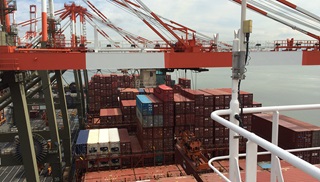From the News Desk: Will diplomacy rule the waves as British Navy starts Hormuz escorts?
A round-up of the key themes emerging from events in the Strait of Hormuz suggests the the UK flag registry will come under continued pressure and that armed escorts seem the only way for British-flagged ships to safely enter the area for the meantime.
Highlights from the Lloyd’s List News Desk this week include: all the latest analysis on events in the Strait of Hormuz, our rundown of the Top 100 Container Ports, a detailed look at the roaring dry bulk market and why the IMO is thawing to the idea of more transparency about how it works
British Navy starts Hormuz escorts
For once, the world is focused on shipping. How the UK’s new Prime Minister deals with the Stena Impero crisis will show whether he stands with scorned lover Europe, or wants to play with new buddy Donald Trump. Boris Johnson’s new hard-Brexit government resumes delicate negotiations this week with Iran to release the UK-flagged product tanker Stena Impero and its 23 crew.
Will Johnson strive for a solution that keeps the European nuclear deal on life support, or embrace the US administration’s ‘maximum pressure’ campaign against Iran?
This test of Britain’s diplomatic independence will have consequences for the UK flag registry, already haemorrhaging tonnage thanks to uncertainty over Brexit. The Strait of Hormuz remains a no-go zone for British flagged ships except with a Royal Navy escort until a diplomatic resolution is found.
Meanwhile, plenty of maritime metaphors spring to mind when it comes to describing the parlous position in which this places UK shipping against the domestic backdrop of Brexit. Some involve creeks and paddles.
We’ve got a special landing page that focuses on our exclusive and expansive coverage on the Stena Impero and Grace 1 detentions, including what’s legal and what’s not, which can be found here.
Pulling rank: 2019’s Top 100 container ports

This week, Lloyd’s List’s Linton Nightingale unveils the Top 100 Container Ports for 2019. This comprehensive overview of the global port sector is a must-read.
Unsurprisingly, Shanghai takes the top spot, but to see the snakes and ladders of container ports fortunes, this interactive guide tells you everything you need about how carrier alliances and global trade overlap and how and where boxtrade power is coalescing.
C Transport Maritime says: I told you so

Everybody loves being able to say “I told you so”, and this week’s Lloyd’s List podcast features C Transport Maritime’s John Michael Radziwill saying precisely that.
The Monaco-based chief executive, who operates a fleet of more than 90 bulk carriers is one of those rarest of breeds: an optimistic shipowner. The dry bulk bull run that has lifted the Baltic Dry Index to a five-year high in the past weeks could last for the next 18 to 24 months, he tells Lloyd’s List.
There’s always a caveat — and that’s for shipowners not to get over-enthusiastic about their recent good fortune and spoil it all by ordering new ships. Radziwill outlines his case here.
We’ll be covering second-quarter earnings season as it kicks off this week. Listed shipping companies will likely find solace in the July’s belter dry bulk month. Will the tanker sector be next?
The heat is on

Everybody has been complaining about the record heatwave across Europe, but the heat on the International Maritime Organization over its transparency and openness appears to be generating some success.
Lloyd’s List has chronicled efforts by some member states to promote greater transparency for the United Nations maritime body by challenging restrictions to public access and media reporting. This overview highlights some of the measures agreed by the IMO Council earlier this month (which media wasn’t allowed to attend) on this very subject.
Importantly, when the media does cover meetings it can access, reporters no longer need to seek permission to quote delegations. That’s a small step needed to properly scrutinise the important regulatory debate coming up about the decarbonisation of shipping and environmental regulation.

